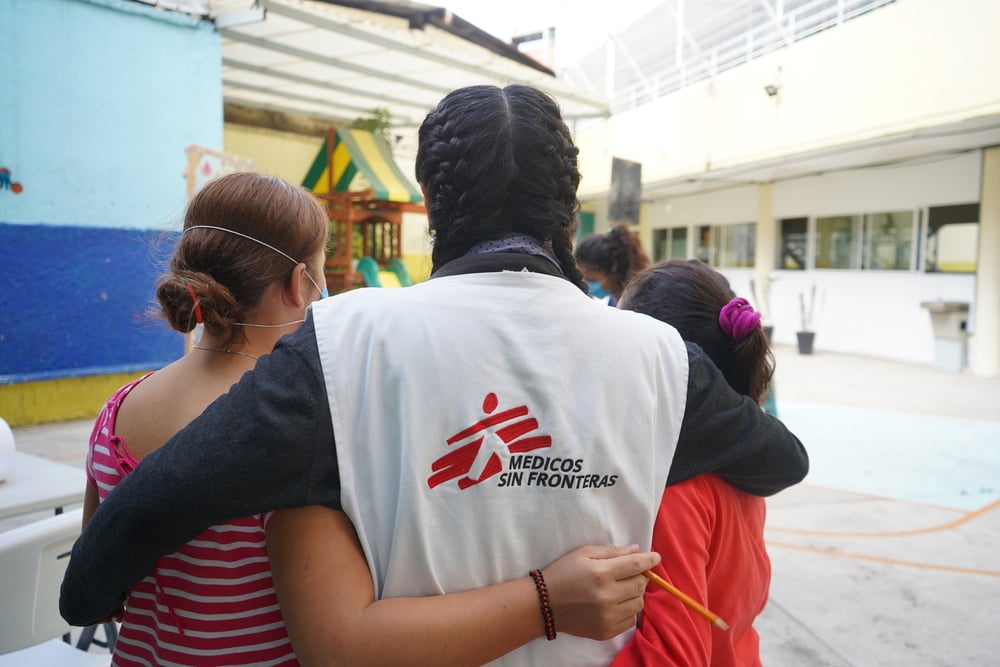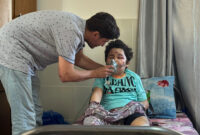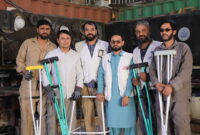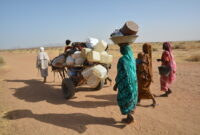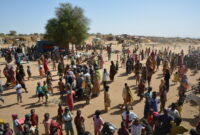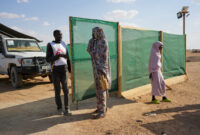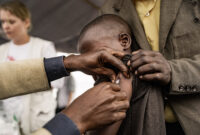Stories from MSF’s Center for victims of torture in Mexico City
The Comprehensive Care Centre, known by its Spanish acronym, El CAI, in Mexico City provides specialized care to people who have experienced torture or extreme violence including harassment and sexual violence. Many of the patients at the CAI are migrants or asylum seekers.
Gustavo* fled El Salvador when his life was threatened. He managed to escape moments before his house was attacked. It saved his life, but he was forced to leave behind his loved ones. “They destroyed everything there—they left bullet holes in the walls, they were going to kill me,” he said. He travelled through Guatemala and into Mexico where he says he was extorted by the police. “I have been discriminated against because I’m gay and because I’m a migrant,” he said.
Gustavo was sexually assaulted while he was living on the streets in Mexico. Soon after, he was referred to a shelter in Tapachula. Here, he was told about the Comprehensive Care Center, known by its Spanish acronym, El CAI, where Doctors Without Borders/Médecins Sans Frontières (MSF), provides specialized medical and mental health care to people who have experienced torture or extreme violence.
Like Gustavo, many of the patients at El CAI are migrants or refugees and have been targeted and discriminated against due to their immigration status, gender, or sexual orientation. MSF has documented high levels of violence, abuse, and maltreatment among migrants and refugees in their country of origin, along the migration route, and in various communities in Mexico severely afflicted by violence. It is a widespread problem that has serious consequences that often are often overlooked.
Here, Gustavo and several others talk about their experience at El CAI and their hopes for the future:
Gustavo: “My relatives watched over and buried that body thinking it was me”
I had to leave because I saw something that I shouldn’t have seen. Someone warned me that I had five minutes to leave my house. I walked through the mountains until I was able to reach a safe point where my brothers picked me up to take me closer to the border. I found out that my house was attacked about 15 or 20 minutes after I left. They destroyed everything there—they left bullet holes in the walls. They were going to kill me. When I came to Guatemala, I was extorted by the border authorities. When I entered Mexico, I was extorted by the police. I slept on the street. I didn’t eat. Someone tried to rape me. I went to UNHCR [the United Nations Refugee Agency]. They saw my situation and sent me to a shelter in Tapachula. When I was there, they told me about El CAI.

In my country, I no longer exist, and as a result, I have lost my family and the life I made. I had a job – I love cooking and that’s what I used to do. Now I think that in the end it doesn’t matter anymore. The most important thing is that I saved my life. But hurts to know that even though my mum and siblings know I’m alive, I can’t be with them.
This December was one of the hardest. In June, it was a year since I left home. It has been very difficult for me to adapt. I think it’s more difficult for me because I’m from the LGBTQ+ community. I have been discriminated against because I’m gay and because I’m a migrant. I have been working. I know about construction. I would like to start a home-remodeling business, be an event planner, or work in the kitchen again.
Alejandro: “I wish I could get it all out of my head”
I’m 23 years old. Because of extortion and violence, I had to leave Peru. They forced me to do things I didn’t want to do. I had to travel through a lot of countries to get here: Ecuador, Colombia, and I crossed the jungle to get to Panama. That’s something I would never go through again in my life. It’s called the Darien Gap. It was seven days of torture. I went hungry, had falls, I saw dead people, people who didn’t make it along the way. I [almost lost] my life on three occasions. The first time I fell from a mountain. I was rolling down for a few seconds. I thought I was going to die, but a person from Haiti saved my life. On another occasion I thought I was going to starve. I went days without eating anything at all. I was very weak, and the river almost carried me away. Thank God I once again came across some Haitians who rescued me.

I find it very difficult to sleep. I’m always thinking about so many things. I get distressed very easily. I would like to feel calm, feel good about myself, stop being fearful and worried; get everything I’ve been through out of my head, but I haven’t been able to do it. I’m afraid of people who talk to me loudly. I’m scared of being alone, I’m scared of the dark. I’m scared to go out onto the street and do what I need to do and look after myself. As much as I want to erase them, those thoughts live with me. A lady at immigration treated me very badly. She yelled at me. It wasn’t just me, she was treating us all badly, but I felt terrible. I almost started crying because it reminded me of a lot of things I’ve been through.
My priority now is to feel good about myself, to feel that I am worth something, to become independent and to be able make a living from music. It’s my passion and I think it’s what has helped me carry on. I’m just waiting for them to give me a resident card to stay in Mexico. I need papers to try to make a life and have a future. I miss my country – I’m not going to lie – my people, my food, the way of speaking, but if I go back, they’ll kill me.
Pablo: “They killed six members of my family”
They killed six members of my family. I don’t know anything about my daughter and her two children. My life has been one hardship after another. I’m not doing well because I’m worried about her and I’m afraid that the worst has happened to her. When I escaped, halfway there, five men who looked like police officers took me off the bus and raped me. They told me that I had to pay them 500 quetzals [about $65 US]. I paid them, but they still raped me. They did what they wanted to me. They left me lying there. I walked a long way, crossed on a raft and got to Ciudad Hidalgo in Mexico. I took a motorcycle that dropped me in Tapachula, and there I slept rough for months.
I went to COMAR* *to start my procedures. I didn’t feel safe in Tapachula. I felt like those who killed my family were still after me. From COMAR I was sent me to a shelter, and I felt a bit safer there. I had a roof over my head, somewhere to wash, and a daily meal. They then brought me here [to El CAI]. For now, I want to finish my treatment. I am in a resettlement program. I have faith in God and I believe that I will survive. I don’t want to stay in Mexico because it’s not a safe place for me and I don’t feel safe going out. I still feel like they’re after me. Here at El CAI I do crafts. I really like painting and I participate in all the workshops they offer us. It helps me and I like it. It helps me distract myself and not think so much about everything I’ve been through.
Rosa: “On the day of the attack my daughters were playing”
I’m a farmer and I lived in a village. Three members of my family were killed in front of me. We decided to flee so that the same thing that happened to them would not happen to us. The only family I’ve got is traveling with me: my husband and my two daughters. That day my daughters were playing about 20 meters away from where the attack happened. I thought they had also been killed. Hours went by without hearing from them. I suffered so much thinking they were dead. My husband, Freddy, and I managed to survive because we hid and escaped. We lived in hiding for a while until we decided to leave.
We took my daughter’s cat with us. Immigration wouldn’t let the cat go through. I told them to please let it go through otherwise my daughter would die of sadness. I said that the only thing she brought was her cat and I asked them for a little compassion. A man in Ciudad Hidalgo gave us a carrier. He said to my daughter; “Look, I’ve got this little box so they let you take it on the bus.” She told him that she didn’t have any money and the man told her that he was giving it to her as a gift.

I don’t know where my relatives are buried. I only carry images of them in my mind. I try not to think about the last time I saw them when they were calling out for help and begging not to be killed. That memory haunts me. I went without help for a long time. I knew I needed help and treatment.
Freddy: “I’m not asking much from life, just to have a ‘normal’ existence”
My wife, Rosa, and my daughters stayed inside the same four walls all day and went out to study at night. I used to go to work and had to wait until night to go home. Sometimes I’d wait in a cemetery or in the mountains. It wasn’t a life for us anymore. That’s why we left. At El CAI I’ve learned to say, “I’m happy”, even though all is not well in my heart.
We were renting a room here in Mexico City but the owner of the house sexually assaulted my youngest daughter. My wife discovered him touching her. We are tired of having to go through so many things. UNHCR has not given us an answer about our resettlement yet and this month is the last month we’re going to receive financial aid. I’m beginning to feel desperate because I’m not sure what will happen to our future. I can’t get a good job without papers. I’m working at a bookbinding company. I work more than eleven hours a day on the night shift and the pay is insufficient. I’m not asking much from life, just to have a “normal” existence, and not to live in fear of every shadow, or every person I see on the street. Just to have enough to support my family, for the girls to go to school and to be able to walk around with them at the weekend in peace, like you see on television or at the movies.
Carolina: “The photos give us visibility and humanize us”
I survived an attempted femicide. Fortunately, I had the strength to escape from my captor and the terrible torture he inflicted on me. The effects on me are both physical and emotional. There are multiple, very serious ramifications for me. In emotional terms it’s post-traumatic stress and recurring nightmares. All this is added to the physical consequences that affect my mobility. I’ve had to cope with a legal process through which I was able to get a bit of justice to get my attacker put in jail, but all my health issues have caused a lot of family problems for me, and my children have also suffered because of what I went through. Our finances were affected in order to continue with my recovery and the legal process. I lost my job and my savings.

My priority is to achieve recovery—emotional, spiritual, and physical balance so I can continue with my life plan. I am a human rights defender, and my goal is to continue working on that, but I need to heal. For those of us who have suffered extreme violence and torture, in Mexico there are no authorities that can really assist us in a comprehensive way like at El CAI. We feel that here, for the first time, we were treated as humans without being revictimized. They understand our processes and needs. I am Mexican, but I understand and empathize with my foreign companions who also receive treatment at the center. We know what it means to feel unsafe, that they’re after you. My attacker died, but in the case of my companions, their attackers have been released or are free and there is the possibility they may kill you at any time. It is terrible to feel under threat. Talking about our experience and have our photos taken make us visible and it humanizes us.
Fabiola: “I hope this message reaches the world”
I’m Mexican. I was born in Mexico City and I’m an architect. In 2019 I was the victim of an attempted femicide at the hands of the person who was my partner at the time. Without a doubt this has been the hardest situation I have had to cope with in my life, along with everything that it triggered: revictimization by the authorities, institutional abuse, at certain times they make you think that you’re crazy, that it didn’t happen or that, if it did happen, you were to blame. I had to deal with the institutions that I thought were going to protect me, and in the end, they turned out to be useless and corrupt.

At El CAI I’ve regained a lot. The two most important things are faith in humanity and the joy of living. Now I can look to the future with hope and get back some of my dreams, like being a mother and dedicating myself to art. Hopefully this message reaches the world so that people know that it is possible to repair and rebuild broken bodies, minds, and hearts.
*Name has been changed for anonymity.
**Mexican Commission for Refugee Aid.
